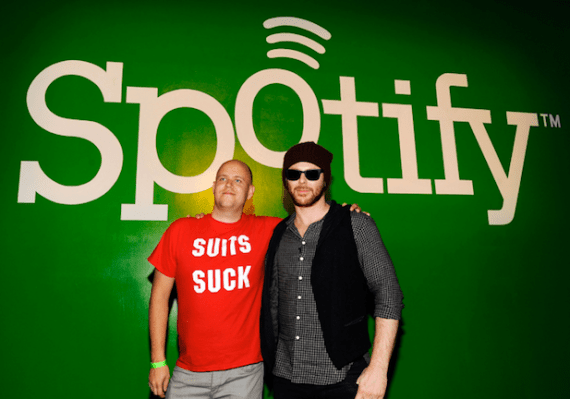As Spotify inches its way to a public listing, the streaming music company — which now has 140 million users — has made some significant changes to its board of directors. Sean Parker, the early supporter and investor who once founded digital music service Napster and helped usher Facebook into the world, has left Spotify’s board of directors, along with Klaus Hommels, another early Spotify backer.
At the same time, Spotify has appointed four new heavy-hitters to raise its corporate profile among investors: Padmasree Warrior, the ex-Cisco CTO and CSO who is now CEO of electric car maker NIO; Disney’s former COO Thomas Staggs; ex-YouTube exec Shishir Mehrotra, and investor Cristina Stenbeck have all joined the board.
The four will join existing Spotify board members, who include Daniel Ek, Christopher Marshall, Martin Lorentzon, Pär-Jörgen Pärsson, Ted Sarandos,
Spotify — which is now valued at around $13 billion and has raised $1.56 billion in funding — has confirmed to TechCrunch that Parker departed around the same time that the other four joined the board. Both Parker and Hommels remain investors and friends to the company, a source says.
News of the four new appointments, meanwhile, was rumored last month, and is now confirmed in a filing with the Luxembourg Trade and Companies Register (uncovered by Swedish site Breakit).
Both Parker and Hommels have been on Spotify’s board since 2009. Parker in particular has been a key part of the company’s business growth, not just as an early investor (the picture above is from around 2010, when the Founders Fund — where Parker used to be a partner — backed Spotify in its Series C) but in terms of Spotify’s business development.
Ironically — given Napster’s early infamy with music sharing — Parker helped Spotify negotiate its first deals with labels to pay licensing fees for music that listeners streamed on the platform. (Those deals were important to establish relationships but they have never been financially lucrative for Spotify, and now they are in the process of getting renegotiated.)
Parker also helped lead Spotify’s move into the US, a significant stage in the company’s expansion, as it is now the streaming business’ single biggest market in terms of revenues and users.
New blood
The new appointments are an interesting mix for the company that points to how Spotify wants to position itself among the pantheon of public tech companies. The latest estimates for Spotify’s IPO reportedly line it up either for later this year but more likely 2018, as a direct listing on the NYSE.
Warrior has deep technical as well as executive experience from a long-time career spent mostly at Cisco — experience that gives her a strong position to consider Spotify as a cloud-based tech business and how best to optimise its assets, and work with others, to improve its margins.
She has been on the boards of companies as diverse as Box and Gap, and currently is on the board of directors at Microsoft, in addition to her executive roles at NIO. (Given the upheaval at Uber and Warrior’s current automotive role, it will be interesting if her name gets floated as a possible executive to refill Uber’s bench, too.)
The appointments of Thomas Staggs and Shishir Mehrotra, meanwhile, underscores Spotify’s desire to push its profile as a media player.
Staggs was a longtime Disney executive (he joined in 1990) who spent his last year at the company as COO before he left in 2016, reportedly because of signals that he was not in line for CEO. Staggs’s background in negotiating deals for a media empire is an area where Spotify increasingly needs to up its game, not just in music but in video, which is still a nascent area for the company but appears to be one that it hopes to grow.
This is also an area where Mehrotra could help the company. He spent many years at YouTube in executive roles in engineering, product and monetization — all areas where Spotify will have to continue to develop its services.
Spotify’s move into video is not just to have something on the market to compete with offerings from the likes of Apple (which is also leveraging its foray into music streaming to expand into video streaming) and more established video streaming services, but ideally to do it all better, more efficiently and in a way that makes the service at the same time more compelling for users and more profitable for Spotify.
Also notable: it looks like Mehrotra is not new to Spotify: he has been a special advisor to the company since 2014, which points the long game the company may be playing with its wider media efforts. We’ve reached out to Spotify to find out if he has or had a more specific role at the company.
While Spotify has made other significant shifts aimed at raising its profile in the US — recall that last year co-founder Martin Lorenzton stepped down as chairman as CEO and other co-founder Daniel Ek consolidated his power as both chairman and CEO — it’s interesting that the fourth new board member is a move in the other direction.
Christina Stenbeck is the Stockholm-based chairman and main owner of Kinnevik, an investment company that has been one of the primary backers of various Rocket Internet ventures, among other businesses. It appears that Kinnevik has never invested in Spotify, but as we’ve noted before, Spotify has been one of the strong tech stories out of Sweden and counts investors in the country as some of its strongest backers. Having Stenbeck in the line-up could be a nod to that part of its investor base. That’s also something to watch in the event that Spotify raises again as a private business.
